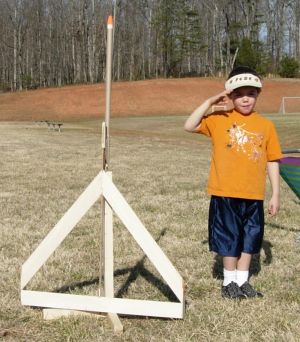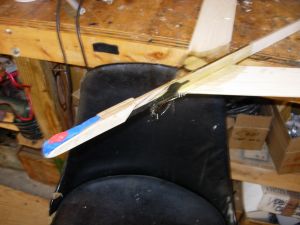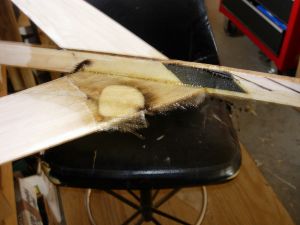Edmonds Aerospace Deltie Thunder
Edmonds Aerospace - Deltie Thunder {Kit}
Contributed by Hank Helmen
| Construction Rating: | starstarstarstar_borderstar_border |
| Flight Rating: | starstarstarstarstar_border |
| Overall Rating: | starstarstarstarstar_border |
| Manufacturer: | Edmonds Aerospace |

Brief:
The Deltie Thunder is a single stage boost glider design. The glider is a
triangle shape with a profile type fuselage that divides the triangle in the
middle. The rocket booster hooks onto the glider at the nose of the glider and
pulls it skyward. At ejection the booster separates and returns via parachute
while the glider slowly circles back to earth
Construction:
The kit contains one main body tube, laser cut 1/4" balsa sheeting for the
wings, horizontal stabilizer, and two side fins. A balsa nose cone is included
as well as fin two reinforcement pieces and two nose reinforcement/booster
hooks. There is an elastic shock cord, a black plastic parachute kit, and an
eye screw for the nose cone attachment. The kit includes a 3/16" launch
lug and some balance clay for the nose section.
The instructions are sparse to say the least. What is there is easy to follow and if you have built the smaller Deltie, detailed instructions are not really needed. No templates are needed as the balsa is all very nicely laser cut. The Deltie Thunder is easy to build. No special tools are needed. I found the balsa in my kit very soft although this makes for a light weight glider, it is too fragile in my opinion. I sanded the balsa wings and vertical stabilizers round at the leading edge and trailing edges.
 Everything
lines up nicely, and the kit was finished quickly using CA glue and Elmer's
white glue. If you have any rocket building experience you can finish this kit
up in just a few hours.
Everything
lines up nicely, and the kit was finished quickly using CA glue and Elmer's
white glue. If you have any rocket building experience you can finish this kit
up in just a few hours.
Finishing:
Full paint on a glider this size could add a lot of unwanted weight. I gave the
glider and booster some trim colors with a day glo orange paint pen then
painted it all over using two coats of Aero Gloss model airplane dope thinned
50%. This adds very little weight yet adds water resistance and needed
stiffness. There was no forward motor block, so I cut a 1/4" piece off of
a spent Estes D12-3 engine casing and glued it into the booster, allowing the
engine to extend 1/2" from the end. The instructions do not say anything
about this at all but it is a good idea. You could also use a wire type motor
lock.
Construction Rating: 3 out of 5

Flight:
The only recommended motor is a D12-3. You will need wadding to protect the
booster's parachute and shock cord. My shock cord burned through or broke on
the first launch.
The Deltie Thunder will require a long 3/16" launch rod. I bought a nice 50" steel rod from the local machine shop. Since the glider hangs below the booster you will need to prop the booster up. I used a 24" piece of 2" x 2" pine (cut from a regular 2x4). The glider is pretty big and if there is any wind you will need a good sturdy launch pad.
My glider required all of the clay supplied for the nose weight and a little bit more after that! I made numerous test glides, first to get it to glide nicely straight ahead and land smoothly, then to get it to circle slightly by adding clay to one wing. The first test glide broke the nose off.
The first launch was very nice, some curves during boost but overall nominal.
Ejection occurred at a slight nose down attitude. This is a hold your breath moment because the glider can hang up on the booster or the shock cord can wrap around the glider's nose or wing.
On this flight however, the glider separated nicely and began a nice fast glide with a left hand circle. After two or three big circles, the bank angle increased close to the ground and the nose dropped causing it to impact the landing area with a higher than nominal velocity. The forward fuselage completely separated from wing section at the joint despite a carbon fiber reinforcement.
Recovery:
The shock cord broke at the mount, however, there was no damage to the booster
and all components were recovered. The glider's fuselage broke apart from
forward wing. It needs heavier balsa in this area or side doublers. Also, there
was a strange round burn through hole in the right forward portion of the wing.
It was extinguished with ground crew's water bottle on scene. The accident
investigation team has not concluded what caused this but speculation is that
it was caused by main engine burn residue during glider separation.
Flight Rating: 4 out of 5
Summary:
The Deltie Thunder is a good flying kit and is easy to build. Builders will
need to carefully test fly the glider in some nice tall grass in order to get
it just right. Fly it does and if you do not put a little clay on one wing to
make it turn, you will probably never get a chance to launch it a second time.
It would be a good idea to put a mailing label somewhere on the wing or at
least write your phone number on the glider.
The main problem with this kit is the fuselage nose area ahead of the wing really needs strengthening. The only other con, and it is a small one, is the motor mount. No engine block ring is supplied in the kit.
The coolest part of the Deltie Thunder is the spectacular flights you can put on! People love to watch it fly. Use a big field because it's a big glider. Do not fly in high winds. Wait for a calm early morning or late afternoon when the wind dies down.
Overall Rating: 4 out of 5
Other Reviews
- Edmonds Aerospace Deltie Thunder By Neil Thompson
Brief: This is a HUGE glider made by Edmonds Aerospace. It has a wingspan of 27 inches and the glider is 34 inches long. It has a 24mm pop pod, which is about 2 feet long, give or take an inch or two. Construction: It has one long 24mm tube for the pop pod, and 3 sheets of laser-cut balsa, which I am guessing is about 1/4 inch thick. Just as easy to build as the original Deltie, ...
- Edmonds Aerospace Deltie Thunder By Ted H. Apke
(by Ted H. Apke) Well I was really hoping that my package from Edmonds would arrive in time for this weekends METRA launch. I was grumping about it on Saturday when my youngest son asked me what this box was sitting in the garage. I have no idea when it arrived or how it got there but it isn't the first time I've found mail sitting in some peculiar place! Spouses <and> ...
 |
 |
Flights
 |
 |
D.S. (August 21, 2009)
Sponsored Ads
 |
 |












H.W.H (March 11, 2006)